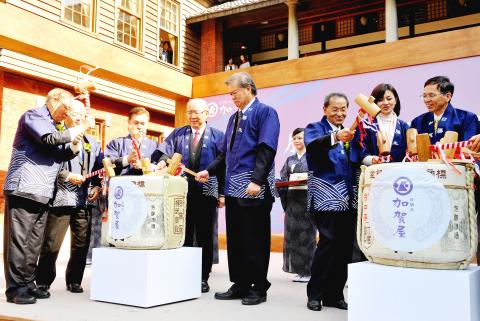Real-estate developer Radium Life Tech Co (日勝生) marked its first foray into the hotel industry on Saturday by opening the doors of the Radium-Kagaya International Hotel Co (日勝生加賀屋), a luxury hot-spring hotel featuring Japanese culture.
The NT$2.7 billion (US$90 million) project is a joint venture between Radium Life and Ryokan Kagaya — a prestigious five-star hot-spring ryokan (Japanese inn) located at Wakura hot spring in Ishikawa, Japan.
Radium Life has taken a nearly 80 percent stake in the venture, while the remainder is held by Kagaya, said Iris Tsai (蔡青樺), -Radium-Kagaya’s public relations supervisor.

PHOTO: CHIEN JUNG-FONG, TAIPEI TIMES
Room prices run from NT$24,000 to NT$120,000 per night.
All 90 rooms have been booked through the end of the month during a promotional rate of as little as NT$14,200 per night to celebrate the opening, Tsai said.
Founded in 1906, Kagaya has been voted by Japanese specialists as Japan’s top hot-spring inn for 30 consecutive years.
The venture in Taiwan marks its first overseas expansion.
The main selling point of the Beitou (北投) Radium-Kagaya is its ryokan maid services, where more than 70 women dressed in kimonos will attend to guests’ needs from check-in to tea serving, bath-robe dressing and meal arrangements.
One maid is assigned to each room and will take care of that room’s guests until they check out to ensure consistent service.
According to Tony Liu (劉東春), vice president of Radium--Kagaya, the luxury inn is confident in achieving an average monthly occupancy rate of 60 percent for the first year, while the return of investment is expected to be fully recouped within 12 years.
The real-estate developer has been aggressive in business diversification in recent years.
While Radium-Kagaya marks its first hotel project, Radium Life in September spent NT$1.2 billion for a 50-year lease from the Taipei City Government to develop land on Fuxing S Road Sec 1 into a service apartment that is slated to open in 2013.
In December last year, Radium Life extended into the department store business by opening Q Square (京站時尚廣場).
The 20,000-ping (66,100m 2), seven-floor Q Square is located across from the Taipei Railway Station and is connected to the Taipei Bus Station. It has enjoyed a steady flow of business thanks to 500,000 daily commuters using the MRT, railway, high-speed rail and bus services.
JihSun Securities Investment Consulting (日盛投顧) gave a “buy” rating and target price of NT$53 to Radium Life in a report dated Nov. 12.
Radium Life closed at NT$43.9 on the Taiwan Stock Exchange on Friday. The stock has risen 62.1 percent since the beginning of the year.
“Its earnings for this year and next will remain in high gear, thanks to ongoing projects and its affiliates that stepped into the department store and hotel sectors,” JihSun researcher Regina Lee (李佳桂) said.

With this year’s Semicon Taiwan trade show set to kick off on Wednesday, market attention has turned to the mass production of advanced packaging technologies and capacity expansion in Taiwan and the US. With traditional scaling reaching physical limits, heterogeneous integration and packaging technologies have emerged as key solutions. Surging demand for artificial intelligence (AI), high-performance computing (HPC) and high-bandwidth memory (HBM) chips has put technologies such as chip-on-wafer-on-substrate (CoWoS), integrated fan-out (InFO), system on integrated chips (SoIC), 3D IC and fan-out panel-level packaging (FOPLP) at the center of semiconductor innovation, making them a major focus at this year’s trade show, according

DEBUT: The trade show is to feature 17 national pavilions, a new high for the event, including from Canada, Costa Rica, Lithuania, Sweden and Vietnam for the first time The Semicon Taiwan trade show, which opens on Wednesday, is expected to see a new high in the number of exhibitors and visitors from around the world, said its organizer, SEMI, which has described the annual event as the “Olympics of the semiconductor industry.” SEMI, which represents companies in the electronics manufacturing and design supply chain, and touts the annual exhibition as the most influential semiconductor trade show in the world, said more than 1,200 enterprises from 56 countries are to showcase their innovations across more than 4,100 booths, and that the event could attract 100,000 visitors. This year’s event features 17

EXPORT GROWTH: The AI boom has shortened chip cycles to just one year, putting pressure on chipmakers to accelerate development and expand packaging capacity Developing a localized supply chain for advanced packaging equipment is critical for keeping pace with customers’ increasingly shrinking time-to-market cycles for new artificial intelligence (AI) chips, Taiwan Semiconductor Manufacturing Co (TSMC, 台積電) said yesterday. Spurred on by the AI revolution, customers are accelerating product upgrades to nearly every year, compared with the two to three-year development cadence in the past, TSMC vice president of advanced packaging technology and service Jun He (何軍) said at a 3D IC Global Summit organized by SEMI in Taipei. These shortened cycles put heavy pressure on chipmakers, as the entire process — from chip design to mass

SEMICONDUCTOR SERVICES: A company executive said that Taiwanese firms must think about how to participate in global supply chains and lift their competitiveness Taiwan Semiconductor Manufacturing Co (TSMC, 台積電) yesterday said it expects to launch its first multifunctional service center in Pingtung County in the middle of 2027, in a bid to foster a resilient high-tech facility construction ecosystem. TSMC broached the idea of creating a center two or three years ago when it started building new manufacturing capacity in the US and Japan, the company said. The center, dubbed an “ecosystem park,” would assist local manufacturing facility construction partners to upgrade their capabilities and secure more deals from other global chipmakers such as Intel Corp, Micron Technology Inc and Infineon Technologies AG, TSMC said. It